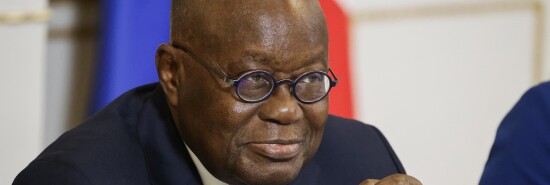
If Europeans should pay reparations for slavery, what about Africa?
Michael Rubin
Video Embed
A special committee of the African Union and Caribbean Community, together representing 75 countries, endorsed the demand that European states should pay reparations for “historical mass crimes.”
Ghanaian President Nana Akufo-Addo explained, “The entire period of slavery meant that our progress, economically, culturally, and psychologically, was stifled. There are legions of stories of families who were torn apart. … No amount of money can restore the damage caused by the trans-Atlantic slave trade and its consequences.”
MYSTERIOUS RESPIRATORY ILLNESS IN DOGS: WHAT TO KNOW BEFORE THE HOLIDAYS
Perhaps Akufo-Addo and the African leaders on whose behalf he speaks should lead by example. The European slave trade was abhorrent, but it was not unique. Slavery was common in Africa prior to the European arrival. Centuries before Europeans penetrated Africa’s interior, enslaving enemies was part of the African way of war. Many slaves dispatched to the Americas from Goree Island in today’s Senegal and Elmina Castle in Ghana first entered captivity when rival Africans enslaved them. By no means does this excuse Europe. Experience of slavery differed between Africa and America, and the thirst for slaves in the Americas’ European colonies created incentives for further African slave raiding.
Nor was Europe the only region engaged in the African slave trade. Centuries before Europeans began trading Africans, there was a thriving Middle Eastern slave trade. In the ninth century, the Zanj, enslaved black Africans, revolted in Basra. Middle East Forum founder Daniel Pipes chronicled early Islam’s slavery of Africans in his Harvard Ph.D. thesis and then his seminal book, Slave Soldiers and Islam. Iranian films such as the 1986 award-winning art house drama Bashu, the Little Stranger explored racism in Iran as a young dark-skinned boy, the ancestor of black slaves imported into Iran, fled the war to overwhelmingly white northern Iran.
The Ottoman Empire enslaved both white and black people. While Turkish President Recep Tayyip Erdogan declares in Somalia that Turkey alone stands against colonialism, he omits that the slave economy drove the Ottoman presence in the Horn of Africa. In 1992, the late Princeton historian Bernard Lewis, the doyen of Middle Eastern studies, republished Race and Slavery in the Middle East, which documented centuries of slavery in the region. Islam may oppose discrimination in theory, but Arabs, Persians, and Turks nevertheless enslaved black people and discriminated against their descendants.
The irony here is that Islamic regimes in Africa continued this slavery. My first trip to Africa was as part of Bill Gray’s “Operation Understanding” in 1989. At the time, black Africans were flooding into northern Senegal from neighboring Mauritania, where the elite Berbers enslaved black people. While Mauritania’s president outlawed slavery in a 1981 decree, its government passed no penalties to disincentivize the practice. In 2001, I saw slavery firsthand in Sudan on a Christian Solidarity International rescue mission that sought to free black slaves whom the Islamist government’s Janjaweed militia had seized on raids into the country’s south.
If Akufo-Addo is serious about righting historical wrongs, where are his condemnation or demands for indemnity from Mauritania and Sudan? Will he demand the oil-rich countries of Saudi Arabia, Iraq, and Iran, each of which benefited from black slavery in centuries past, pay?
Perhaps that is a bridge too far. He might instead start where he actually has authority. If the evils of ancestors are cause for compensation today, shouldn’t Ghana be the first to pay? After all, more Ghanaians today descend from slave traders than slaves.
Akufo-Addo knows this. So, what truly motivates him? Ghana’s debt today is $50 billion, and its debt-to-GDP ratio is close to 90%. In just three months last spring, its debt increased 20%.
CLICK HERE TO READ MORE FROM THE WASHINGTON EXAMINER
Rather than acknowledge responsibility for decades of economic mismanagement, Akufo-Addo seeks to shake down Europe to seize advantage of the West’s political correctness and tendency to self-flagellate. To legitimize such tactics would itself be racist as it would reject Africans’ agency in the decisions that led to their current financial morass.
It is time to dismiss bailouts, reject extortion attempts, and recognize that cherry-picking the past is no way to secure freedom and prosperity for the future.
Michael Rubin (@mrubin1971) is a contributor to the Washington Examiner’s Beltway Confidential blog. He is a senior fellow at the American Enterprise Institute.
